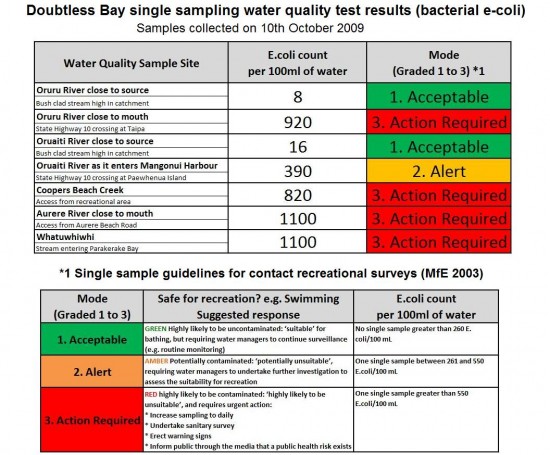Independent community-lead water quality testing of Doubtless Bay’s rivers and streams has highlighted the deteriorated state of water quality in the bay area. As part of Doubtless Bay Community Care for Our Catchment, a programme being co-ordinated by the Far North Environment Centre, seven water quality sample sites will be continually monitored over the next three years and reported back to hapu and communities in the Bay. To help raise public awareness of the issues around fresh water quality, the testing aims to summarise both the environmental and human health risk at each site. To achieve this goal the levels of Ph, nitrate, ammonium, phosphate, total solids, bacterial faecal coliform, and bacterial e-coli are tested at each site at least once every month (twice a month over the summer period) by testing accredited firm Envirolab. The locations of the sample sites, and all the test results can be viewed on the Far North Environment Centre's website here.
The water quality at each site is assessed and reported according to the Ministry for the Environment and Ministry of Health ‘Microbiological Water Quality Guidelines for Marine and Freshwater Recreational Areas’ revised and issued in 2003. The guidelines recommend a three-tier (traffic-light) management framework according to single sample results of E. coli. Utilising bacterial e-coli levels at each site as a general indicator of overall water quality, results generated over the last two months have recorded potential issues in all the samples collected in low lying waterways.
It would appear that as water passes through waterways in the Bay the water quality significantly deteriorates. For samples collected on 10th October, four of the five samples collected in the low lying waterways recorded the highest level signal of “Red, Action Required”. The management framework suggests that the water at these sites is highly likely to be contaminated, and requires the following urgent action:
- Increase sampling to daily
- Undertake a sanitary survey
- Erect warning signs
- Inform public through the media that a public health risk exists
Unfortunately the resources of the Far North Environment Centre are not able to cover the cost of daily sampling. However, the Far North Environment Centre is in the process of contacting both Northland Regional Council and Northland District Health Board to see if further action is required. The Far North Environment Centre would also like to stress that the sampling results gained are only a snap shot of water quality on that day the sample was taken, and should NOT be used as a recommendation or guidance for general water quality, safety, or activities e.g. guidance on whether it is safe to collect shellfish
Across New Zealand land use changes have typically resulted in the loss of vegetation along waterways, the realignment of streams, increased sediment and nutrient loading and greater areas of impervious surface resulting in a range of stressors on aquatic and terrestrial environments. The natural physical environment and hydrological processes are increasingly impacted by development, subdivision and some farming practices.
These issues are highly evident in Doubtless Bay, and the hapu and communities in the Bay face considerable land and water management issues. Land catchment management in Doubtless Bay directly affects the water quality of its streams, rivers, harbour and sea. Doubtless Bay Community Care for Our Catchment is an integrated catchment management programme. It aims to connect hapu, landowners, stakeholders and communities within the catchment so that a unified plan can be formulated to improve the quality of both fresh water and seawater within the Bay area. As part of “future proofing” Doubtless Bay the programme will then support positive action to achieve those improvements. A hui is planned for Friday 6th November at Taipa Area School Whare, and everyone is invited to join in. For more information contact Richard at the Far North Environment Centre on 09 408 1086, or email h2o@ecocentre.co.nz
Schools, groups and individuals are urged to participate by monitoring their nearby waterways (kits available at the Environment Centre) and adding their thoughts, experience and expertise to the planning process. A water quality testing workshop is also being planned for Saturday 7th November, watch this space.



Comments
Trisha Edwards
Taipa Coastcare